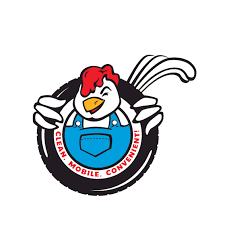A KCED Summer 2024 Newsletter Article:
According to Becky, “Happy animals are healthier animals, and I want to feed my family those animals, and I want others to have that same access.” Becky and Greg started raising their chickens because they enjoyed eating home-grown chickens and providing for their family. There was one complication: access to processing assistance was a challenge that other chicken producers also shared. After brainstorming and seeing the demand for sustainable food practices and the need for clean processing brought directly to farmers, the Wierschkes decided to expand their business and Clean Chickens and Co. LLC was born.
The USDA-certified mobile processing trailer comes to the farm and processes anywhere from 75 to thousands of chickens. This model reduces the stress on the chicken by eliminating transportation to a slaughterhouse, and it helps the family feel good about knowing where the food on their table comes from. Clean Chickens and Co. LLC offers a unique service.
Headquartered out of Elk River, Minnesota, the Wierschkes were looking for a place to expand. In addition to chickens, they found a market for Halal-certified goat processing. Halal means ‘allowed’ or ‘lawful’ in Arabic and refers to how an animal is raised, slaughtered and processed. To be considered Halal, the animal will have been raised through a specific process and the animal experiences minimal suffering during processing. A prayer is said over the animal by a Muslim slaughter man who must face Mecca, Islam’s holiest city, in addition to other rituals. Most Halal-certified food is imported to the United States from countries like Australia and is frozen, not fresh. The new Happy Halal processing plant will increase local accessibility of fresh goat meat, a meal staple for many of Minnesota’s Muslim families. The chicken side of the operation will offer only cutting and wrapping, a process which will also be applied to the goats.
Another unique characteristic of the operation is the culturally diverse path the product will take. “We will have a slow ramp-up,” Wierschke said, “likely only processing 2,500-10,000 goats/lambs per year and slowly working our way up to 26,000 per year.” A surprising answer was received when asked where the goat farms are located. “Most of our goat producers are Amish,” according to Wierschke. How was the connection made between Happy Halal producing meat under Islamic faith law and farms owned by people of the Amish faith? “AURI, or the Agricultural Utilization Research Institute, helped us make the connection.”
Diversity and cultural integration are normal for the Wierschke family, who have a profoundly deaf child. Originally from near the Red Lake Reservation, they took their daughter to the Reservation clinic, where she received specialty care for her hearing, thus their daughter’s first language of the Anishinaabeg or Ojibwe culture. This is one example of how the family has been adaptable to integrating other cultures into their daily life.
Happy Halal plans to employ people from all walks of life, including Muslim slaughter men, the local diverse workforce, and Shanghai Wholesale Market Place in St. Paul for distribution, which is an Asian grocery store that also advertises serving Mexican and African specialty stores. The product will make its way to Elk River and back to Willmar, where Shanghai Market has a direct sales agreement with grocery stores, and fill the shelves for purchase.
Clean Chickens and Co. LLC and Happy Halal’s mission is to make food and access to healthy food sustainable regardless of land size and location. The processing plant, which will be located in the Willmar Industrial Park, will help make this possible.
Wierschke also commends the presence of Jennie-O in the Park, being one of the first industries to build there, and thus making the infrastructure possible for a new endeavor like theirs. Funding for the project has been made possible with a grant from the USDA’s MPPEP2 Program, The Minnesota Department of Agriculture’s- AGRI Meat, Poultry, Egg and Milk Processing Grant, and AGRI Value Added Grant. Becky and Greg also wish to thank the Department of Ag Rural Finance Authority, and its Meat and Poultry Intermediary Lending Program, AURI MN Farmers Union (MFU), Minnesota Commissioner of Agriculture Thom Pederson, U.S. Senator Tina Smith, St. Cloud Small Business Development Center (SBDC), Kandiyohi County Economic Development (KCED), Southwest Initiative Foundation, the City of Willmar, and the many, many people who have helped make this community project possible.
The Wierschkes will close on approximately 4.5 acres of land in Willmar’s Industrial Park in mid-June. Construction is estimated to start in early October 2024 and will take about six months to complete. They are grateful for the partnership with the City of Willmar and KCED to move this development forward in positive and impactful ways that address diversity and remove cultural barriers through economic growth.
*This article first appear in the Summer 2024 KCED Newsletter*

